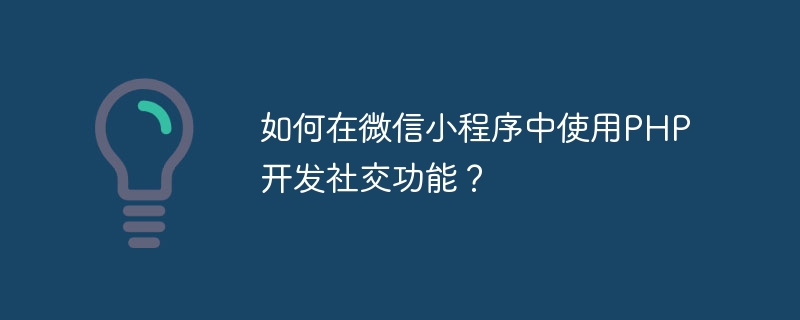Home >Backend Development >PHP Tutorial >How to use PHP to develop social functions in WeChat mini programs?
How to use PHP to develop social functions in WeChat mini programs?
- WBOYWBOYWBOYWBOYWBOYWBOYWBOYWBOYWBOYWBOYWBOYWBOYWBOriginal
- 2023-10-26 09:52:57847browse

How to use PHP to develop social functions in WeChat mini programs?
As an emerging application development platform, WeChat mini program provides users with rich social functions. Combined with the powerful processing capabilities of the PHP language, we can implement various social functions, such as friend circles, private messages, likes and other functions. The following will take the circle of friends in the WeChat mini program as an example to introduce in detail how to use PHP to develop social functions.
1. Preparation
First, we need to create a small program and obtain the AppID and AppSecret of the small program. At the same time, to build a PHP development environment, you can use an integrated development environment such as XAMPP or WAMP, or you can use a self-configured PHP environment.
2. Interface design
Next, we need to design the front-end and back-end data interaction interface. In this example, we can design the following interfaces:
- Get Moments list interface: used to obtain the user’s dynamic list of Moments;
- Publish Moments interface: users can This interface publishes the dynamics of their own circle of friends;
- Like function interface: users can like the dynamics of their circle of friends through this interface.
3. Data Storage
In order to realize the circle of friends function, we need to create corresponding tables in the database. In this example, we can create the following data tables:
- User table: stores basic information of users, including username, avatar, openid, etc.;
- Dynamic table: stores users The dynamic information of the circle of friends, including dynamic content, release time, etc.;
- Like table: stores the user's dynamic like information, including user id, dynamic id, etc.
4. Coding implementation
-
Get the friend circle list interface:
First, we need to call the wx.request() method on the mini program to send HTTP requests to the back-end interface. The interface code example is as follows:wx.request({ url: 'http://yourdomain.com/api/getMoments.php', success: function (res) { // 处理返回的列表数据 } })The back-end code example is as follows:
<?php // 连接数据库 $conn = new mysqli($servername, $username, $password, $dbname); if ($conn->connect_error) { die("数据库连接失败: " . $conn->connect_error); } // 查询朋友圈动态列表 $sql = "SELECT * FROM moments"; $result = $conn->query($sql); // 将查询结果转为JSON格式返回 $posts = array(); if ($result->num_rows > 0) { while($row = $result->fetch_assoc()) { $moments = array( 'id' => $row['id'], 'content' => $row['content'], 'time' => $row['time'], // 其他字段 ); array_push($posts, $moments); } } echo json_encode($posts); $conn->close(); ?> -
Publish the friend circle interface:
In the mini program , users can submit dynamic content to the back-end interface through the form. The interface code example is as follows:wx.request({ url: 'http://yourdomain.com/api/postMoment.php', method: 'POST', data: { content: '这是我的第一条朋友圈动态' }, success: function (res) { // 发布成功后的处理逻辑 } })The back-end code example is as follows:
<?php $content = $_POST['content']; // 连接数据库 $conn = new mysqli($servername, $username, $password, $dbname); if ($conn->connect_error) { die("数据库连接失败: " . $conn->connect_error); } // 插入动态内容 $sql = "INSERT INTO moments (content) VALUES ('$content')"; if ($conn->query($sql) === TRUE) { echo "动态发布成功"; } else { echo "发布失败:" . $conn->error; } $conn->close(); ?> -
Like function interface:
Users can submit the like information to the back-end interface by clicking the "Like" button in the circle of friends. The interface code example is as follows:wx.request({ url: 'http://yourdomain.com/api/likeMoment.php', method: 'POST', data: { moment_id: 1 }, success: function (res) { // 点赞成功后的处理逻辑 } })The back-end code example is as follows:
<?php $moment_id = $_POST['moment_id']; // 连接数据库 $conn = new mysqli($servername, $username, $password, $dbname); if ($conn->connect_error) { die("数据库连接失败: " . $conn->connect_error); } // 插入点赞信息 $sql = "INSERT INTO likes (user_id, moment_id) VALUES ('$user_id', '$moment_id')"; if ($conn->query($sql) === TRUE) { echo "点赞成功"; } else { echo "点赞失败:" . $conn->error; } $conn->close(); ?>
In this way, we have completed the example of using PHP to develop social functions in the WeChat applet. Through the above steps, we can realize the browsing, publishing and like functions of the circle of friends. Of course, functions can be expanded and optimized according to actual needs. Hope this article is helpful to you!
The above is the detailed content of How to use PHP to develop social functions in WeChat mini programs?. For more information, please follow other related articles on the PHP Chinese website!
Related articles
See more- Ten of the most common mistakes PHP developers make
- WeChat Mini Program Mall Development to Implement the Function of Adding Products to the Shopping Cart (Code)
- What is the method to set full screen for WeChat applet on computer?
- How PHP and Unity3D use Workerman to implement social functions in games

